Supreme Court Rebuffs Trump Administration On DACA
The Supreme Court has declined an invitation to intervene early in the legal arguments surrounding DACA.
The Supreme Court has declined to accept the Federal Government’s request for an immediate appeal of a San Francisco Federal Judge’s order barring the Administration from enforcing President Trump’s order to bring the Deferred Action for Childhood Arrivals (DACA) program to an end:
WASHINGTON — The Supreme Court on Monday rejected an unusual request from the Trump administration to decide whether it was entitled to shut down a program that shields some 700,000 young, undocumented immigrants from deportation.
The court’s decision not to hear the administration’s appeal was expected, as no appeals court has yet ruled on the issue.
The court’s move came amid a complex political battle over immigration generally, and the program at issue in the case, Deferred Action for Childhood Arrivals, or DACA, in particular.
The program shields people who were brought into the United States as children from deportation and allows them to work. The status lasts for two years but is renewable.
In September, the Trump administration announced that it would shut down the program on March 5. But two federal judges have ordered the administration to maintain major pieces of the program while legal challenges move forward, notably by requiring the administration to allow people enrolled in it to renew their protected status.
The administration did not seek stays of those court orders, and they will remain in place for the time being, allowing much of the program to survive beyond the March 5 deadline.
The case at the Supreme Court was brought in California by five sets of plaintiffs. They included four states — California, Maine, Maryland and Minnesota — and Janet Napolitano, the president of the University of California. As secretary of homeland security in the Obama administration, Ms. Napolitano signed the document that established the program in 2012.
In January, Judge William H. Alsup of Federal District Court in San Francisco ruled that the administration had abused its discretion and had acted arbitrarily and capriciously in rescinding the program. Judge Nicholas G. Garaufis of Federal District Court in Brooklyn issued a similar ruling this month.
The judges acknowledged that presidents have broad powers to alter the policies of earlier administrations. But they said the Trump administration’s justifications for rescinding the program did not withstand scrutiny.
The administration had argued that the program was an unconstitutional exercise of authority by the executive branch, relying on a ruling from the United States Court of Appeals for the Fifth Circuit, in New Orleans, concerning a related program. The Supreme Court deadlocked, 4 to 4, in an appeal of that ruling.
The judges said the two programs differed in important ways, undermining the administration’s legal analysis. They noted, too, that Mr. Trump had issued conflicting statements about the DACA program.
Both judges issued nationwide injunctions ordering the administration to retain major elements of the program while the cases moved forward. Such nationwide injunctions from judges in individual cases, which have been used to block executive actions in both the Obama and Trump administrations, have been the subject of much commentary and criticism.
The judges required the administration to accept renewal applications but not new ones, and they said the administration need not allow existing participants to return to the United States after traveling abroad. And they noted that the administration retained broad powers to make individualized decisions based on national security, public safety and other factors.
The administration appealed Judge Alsup’s ruling to the United States Court of Appeals for the Ninth Circuit, in San Francisco, and that court put the appeal on a fast track. In an unusual move, the administration also asked the Supreme Court to grant immediate review, leapfrogging the appeals court.
That procedure, called “certiorari before judgment,” is used rarely, typically in cases involving national crises like President Harry S. Truman’s seizure of the steel industry and President Richard M. Nixon’s refusal to turn over tape recordings to a special prosecutor.
In a brief urging the Supreme Court to deny review, lawyers for the University of California wrote that “it has been nearly 30 years since the court granted certiorari before judgment without the benefit of a court of appeals ruling on the question presented.”
In a second brief, lawyers for the four states wrote that no national emergency warranted use of the unusual procedure.
“Since 2012, the DACA program has allowed hundreds of thousands of young people to receive deferred action, work authorization and other benefits,” they wrote. “The district court’s preliminary injunction only partially and temporarily restores the situation that existed before petitioners’ abrupt decision to terminate the program — and only for individuals who had already received deferred action under DACA.”
As noted, this decision by the nation’s highest court comes in the context of the injunctions that were issued by Federal Judges in San Francisco and New York City. These rulings blocked the Administration from enforcing the President’s September order ending the program after the end of a six month period that would have ended on March 5th, less than two weeks from now. Because of that, the people who were protected by DACA remain under that protected for the time being, although it is unclear what they mean for people whose DACA eligibility may have ended under the Obama Administration’s order unless it could be renewed. Additionally, the rulings do not require the Administration to accept any new DACA applications that might have been submitted since the orders were entered. In addition to filing an appeal of the San Francisco ruling to the Ninth Circuit, the Administration also took the somewhat unusual step of appealing the San Francisco case to the Supreme Court, asking for both a rarely granted direct appeal of the case from District Court to the Supreme Court and for the injunction to be lifted.That request is what the Court denied today, meaning that the Administration will have to rely on its appeal in the Ninth Circuit, and an appeal of the New York City ruling to the Second Circuit Court of Appeals, in order to move these matters forward in the Court.
Effectively, this means that the March 5th deadline for the expiration of the DACA program is on hold indefinitely and that the DACA program itself is likely to stay in existence until at least some time in 2019 even without Congressional action. This is because of the fact that, even if they are considered on an expedited basis, the appeals of the two Federal District Court Orders to the Ninth and Second Circuits are unlikely to be ruled on for several more months, well past the time when the Court sits for its last session of oral argument for the current term. Additionally, regardless of which side wins at the respective Circuit Courts of Appeal, any appeal to the Supreme Court would end up with those cases that would be scheduled for oral argument when the Court sits for the term that begins in October 2018. As a result, if accepted by the Justices the cases would be scheduled for oral argument during one of the periods in October, November, or December of this year when the Court would be sitting for oral argument. Even if the cases are heard early in the term, though, there’s a good possibility that a decision might not be handed down until later in the term during the winter or spring of 2019. So, unless either the Ninth or Second Circuit Courts of Appeal lift the injunctions that the District Court Judges imposed, enforcement of the Administration’s September 2017 order could remain on hold until some time in the opening months of 2019 at the earliest.
This significant legal development, and the fact that it means that the March 5th deadline is now, as NBC News’s Pete Williams put it on the air this morning, effectively a “dead letter.” will likely have a significantly impact on the ongoing debate in Congress over finding a permanent legislative fix that would legalize the DACA recipients and remove them from their current legal limbo. As I noted in my most recent post on those developments, the hopes for any such fix were quite grim when Congress left town prior to President’s Day for a weeklong “work period” back in legislator’s home states and districts. Prior to that point, the Senate had voted down four separate proposals for a DACA fix. The proposals that were rejected included one from a bipartisan group of Senators that would have legalized DACA beneficiaries and others who meet the DACA criteria but were unable to apply for the program for some other reason as well a provide funding for some border security programs. Another rejected proposal consisted of the one that the White House had submitted that provided legal status for as many as 1.8 million people who are either current DACA beneficiaries or who fall within the basic criteria of that program, provided funding for border security that included the President’s border wall, ended the visa lottery, and placed significant restrictions on other aspects of legal immigration. Under both of these proposals, DACA beneficiaries would have been eligible to apply for citizenship after a period of 10-12 years. Over in the House, meanwhile, it was clear that none of the proposals that the Senate had been considering would have passed the House and Republicans in that body were instead considering a bill that granted legal status to DACA beneficiaries but barred them ever becoming citizens while providing funding for the President’s border wall, ending the visa lottery, and ending so-called “chain migration” under which legal residents can sponsor family members for immigration and a so-called “green card.” Finally, the White House has taken the position that the President would veto anything that didn’t include every element of the President’s proposal I made note of above. Because of this, Congress faced the prospect of returning to town this week for a period during which at least part of the calendar would be preempted by the honors for the late Billy Graham, who died last week will lie in honor in the Capitol Building beginning later this week.
With this decision by the Supreme Court, the pressure that Congress was facing to act by March 5th, which was already effectively relieved by the two outstanding District Court Orders, is now indefinitely on hold.
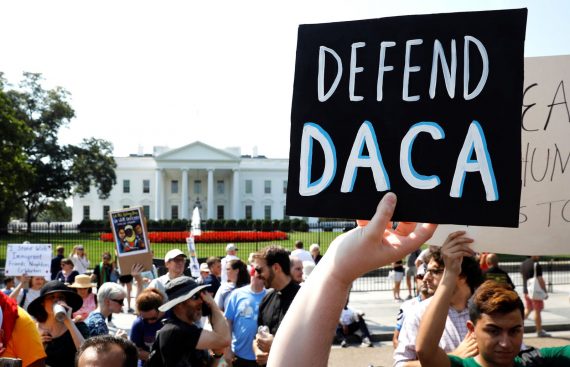

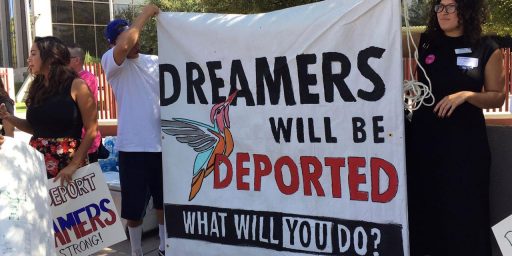
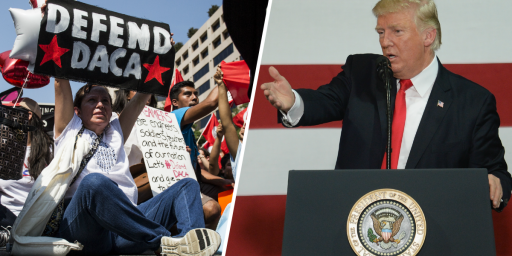
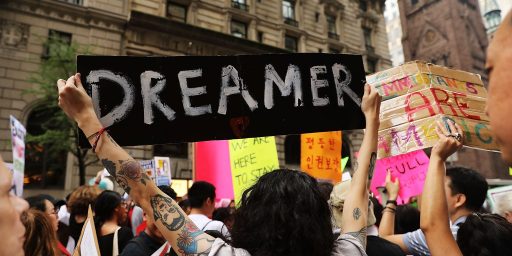
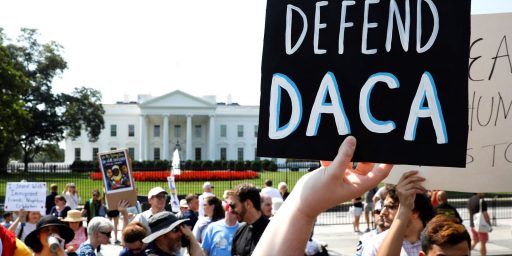
Thanks for that excellent analysis. I was hoping you’d write it so I don’t have to try and make sense of the legalese myself.
So Trump would charge a hail of AR-killyou bullets. HA!
He is as full of sh!t as the day is long!
The Secret Service would have his flabby arse on the ground at the sound of the first shot!
Looks like Pud is laying on his back changing the oil and someone came by his shade tree and kicked three of the jack stands out from under the car.
If the fourth one goes it will squish his pumpkin head!
Let’s see if he can survive that!
Will DACA, me too, and the school shootings be enough to seriously change those numbers? We can only hope so.
Trump put a deal on the table that would add more to the DACA people by one million, and a path to citizenship. What in the world else do they want?
And these federal judges who want unlimited immigration – they can take care of them.
And these federal judges who want unlimited immigration…
Tyrell, please cite any case in the Federal or State Courts, past or present where a Judge wrote an opinion that stated that there should be unlimited immigration from foreign countries into the United States.
This is off topic, but I’m just sitting here wondering if Trump saying he would charge the shooter unarmed is the stupidest lie Trump’s ever said, or the stupidest lie anyone’s ever said?
@teve tory:
How dare you! Not many people know that Cadet Bone Spurs is a brave man. Some people say he’s the bravest man in America. Believe me.
@Tyrell:
Let’s see, They want family reunification for one, something I think any “family values” voter would be in favor of, don’t you? One thing they don’t want is a billion dollar boondoggle wall that will take private land from US citizens, be an environmental disaster, and won’t even work as intended.